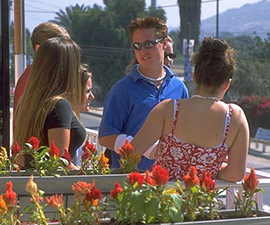 Hablas Espanol? Well, in Spain the predominant language spoken is Castillian or Espanol, however there are several other languages spoken which are now are officially recognised by the Spanish government.
Hablas Espanol? Well, in Spain the predominant language spoken is Castillian or Espanol, however there are several other languages spoken which are now are officially recognised by the Spanish government.
Three of these languages are Catalan, Euskara Batua and Galician. By allowing these languages to gain full status and be officially recognised and accepted, the Spanish people have safeguarded their place in Spanish history.
Catalan Catalan is spoken in some parts of Spain, isolated areas of France & Sardinia and is also the national language of Andorra. Approximately 4 million speakers worldwide use Catalan as their first language and a similar number who use it as a second language. Some linguists stress that Catalan has more in common with Italian in terms of grammar and syntax, whilst the spoken form is reminisce of a cross between French & Spanish.
There are also several other dialects of Catalan, eg: Valencian. Many in the "Pai Valencia" still claim that Valencian is a language in its own right. However, Catalan is considered a Romance Language. Euskara Batua (unified Basque) Euskara is mainly a rural language and is widely spoken throughout the Basque region of Northern Spain.
The majority of Basque speakers live in Spain whilst others live over the border in Pyrenean France. The Basques are a fiercely proud people and have an extremely developed sense of regional identity. The language itself has 600,000 speakers on both sides of the Franco-Spanish border. This language has always proved to be something of a mystery to linguists as it does not appear to be related to any other language.
Euskara bears no relationship to the indo-European family of languages which includes all of the other languages of Europe. There are several regional variations of Eushara, however a standardised version, Euskara Batua, has been established for use in the media and in schools during the last few decades.
Galician Galicia is one of Spain's more isolated regions not yet affected by mass tourism, the region is subject to some of Spain's worst weather and is also home to its third largest language. Galician is spoken by 3 million Spaniards in Galicia itself and also in the neighbouring regions of Asturias and Castille-Léon.
The language bears strong similarities to Portuguese, a factor that is explained by the close proximity of the region to Portugal. The Portuguese language did in fact develop originally in Galicia and Northern Portugal, before a political split in the 14th century separated the two areas allowing the languages to develop and grow independently of each other.
The native Galician will be able to understand most Portuguese - similar vocabulary and word order can be seen across both languages and there is fierce debate once more as to whether they are languages in their own right, or dialects of the same language. Again much of it has to do with the perceived independence of the region that is, in many ways, symbolised by its language.
Like Catalan and Euskara, Galician now has an official status and is taught in schools adding weight to the strong social movement to protect and preserve the language.
When visiting Spain, it is worth learning a few simple Spanish phrases and key words. It is important to respect and recognise the differences in various languages.
Learning Spanish has become a popular course for many people, but as with any language, your confidence and ability will flourish the more you use it. So the next time you visit Spain, why not try out some of your newly learned Spanish. Fortuna y adios.